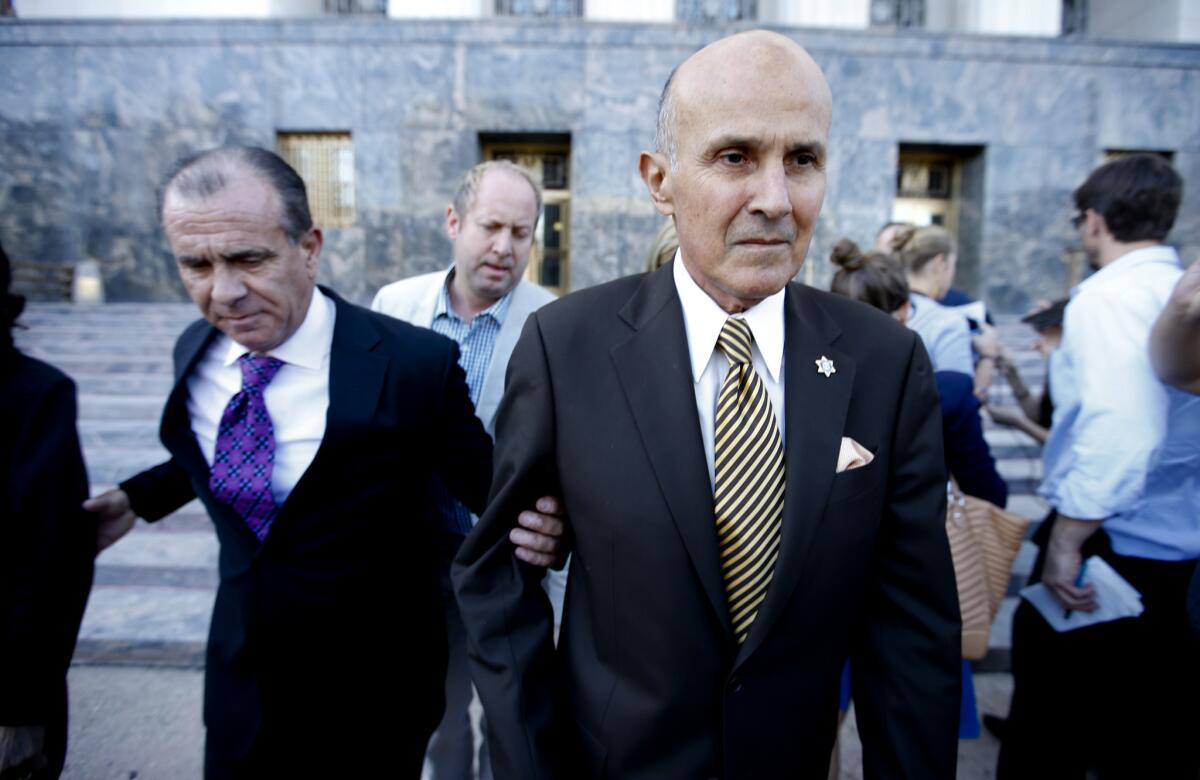Ex-Sheriff Baca wants doctor who specializes in mental illnesses to testify in his corruption trial

- Share via
With his criminal trial weeks away, former Los Angeles County Sheriff Lee Baca was in court Tuesday, battling with prosecutors over whether a key witness can testify about his mental health.
Also during the hearing in a downtown federal courtroom, an attorney for The Times said the newspaper would fight an effort by prosecutors to force a former reporter to testify about an interview with Baca, on the grounds that reporters are shielded from having to testify about their reporting.
Lawyers for Baca argued that Dr. James Spar, a psychiatrist at UCLA, should be allowed to take the stand during the trial, which is scheduled to begin on Dec. 6.
Spar specializes in mental illnesses affecting the elderly and would tell jurors that although Baca was not diagnosed with Alzheimer’s disease until this year, it is likely he was already suffering from the early stages of the degenerative illness in April 2013, when he agreed to be questioned by federal investigators, attorney Nathan Hochman said.
Assistant U.S. Atty. Brandon Fox objected strongly, saying Spar’s conclusions were unfounded and amounted to “junk science.”
U.S. District Judge Percy Anderson did not rule Tuesday, saying he would issue a decision on Spar’s testimony at a later date.
The proposed testimony by Spar, a well-regarded authority, is an important component of the defense that Baca’s legal team is hoping to mount at trial. Spar is expected to tell jurors it is reasonable to believe Baca’s memory had already begun to deteriorate at the time of the interview, leaving him incapable of clearly recalling what had occurred two years earlier.
During that interview, Baca told investigators repeatedly that he had not been involved in — or even known about — various aspects of a scheme subordinates carried out two years earlier to obstruct an FBI probe into abuses by sheriff’s deputies working in county jails. Prosecutors allege Baca’s claims of ignorance were untrue and have charged the former sheriff with lying to federal officials — a felony.
Fox, the lead prosecutor in the case, emphasized repeatedly in making his case against Spar that the psychiatrist had not relied on any hard evidence in Baca’s medical record, but instead was “cherry-picking” isolated examples of forgetfulness to support his conclusion.
“This is pure speculation,” Fox said.
Jurors will be unfairly swayed to feel sympathy for Baca if Spar is allowed to testify, Fox added.
Anderson appeared doubtful about allowing Spar’s testimony. He grilled Hochman relentlessly, forcing the attorney to concede that no medical tests had been conducted to assess Baca’s mental acuity at the time of the 2013 interview.
Hochman countered that, despite the lack of tests, Spar could accurately extrapolate that the disease had taken hold in 2013 based on his review of Baca’s responses during the interview and what is known about the progression of the disease in the years before symptoms become apparent.
The legal jostling is the latest turn in a remarkable fall from grace for the 74-year-old Baca, who served for 15 years as L.A. County’s top law enforcement official before resigning in 2014 amid questions about his role in the blossoming scandal.
Baca’s downfall stems from 2011, when sheriff’s officials discovered FBI agents were secretly gathering evidence of widespread beatings of inmates and other abuses by deputies. In the weeks that followed, a group of deputies and mid-level commanders led by Baca’s second in command, then-Undersheriff Paul Tanaka, worked to thwart the federal investigation by hiding an inmate who was working as an FBI informant and threatening the lead agent in the case with arrest.
A team led by Fox has successfully prosecuted many deputies and sheriff’s officials either for beatings or playing a role in the obstruction plan. Most recently, Tanaka was convicted earlier this year and sentenced to five years in prison — a verdict he is appealing.
As he watched his colleagues either be convicted or plead guilty, Baca maintained his innocence. But in February, after prosecutors made it clear to him that they were preparing to bring charges against him, the former sheriff agreed to plead guilty to a single charge of lying to investigators as part of a deal with prosecutors.
Despite Baca’s diagnosis of Alzheimer’s, Anderson, the judge, rejected the deal because it called for Baca to serve no more than six months in prison — a sentence the judge found was too lenient. Uncertain of how harshly Anderson planned to come down on him, Baca opted to withdraw his guilty plea and take his chances at trial.
Shortly after Baca backed out of the deal, he was indicted on charges he obstructed the FBI investigation, conspired to carry out the plan with others and made several false statements during the 2013 investigation.
The question of Baca’s mental health has largely shaped the lead-up to trial. With Baca’s attorneys indicating they would use Baca’s Alzheimer’s diagnosis as part of their defense, Fox preemptively asked Anderson to order that Baca’s competency to stand trial be assessed by an independent expert.
The results of that evaluation have been kept confidential, but both sides agreed in a court filing that Baca is able to understand the charges against him and is fit to go to trial.
Whether or not Spar is allowed to testify, Hochman must still defend Baca against the obstruction and conspiracy charges that Baca played a role in the plan to interfere with the FBI probe in 2011.
On Tuesday, under questioning from Anderson, Hochman conceded that Spar, if he is allowed to testify, would not claim there was reason to believe Baca’s alleged actions in 2011 were a result of Alzheimer’s.
The two sides also made arguments on a separate matter: whether Hochman should be allowed to play excerpts of the audio recording of the 2013 interview, which the attorney argued were needed to fairly depict the statements by Baca that prosecutors say were lies. Anderson said he would rule on that question next week.
At the end of the hearing, Fox alerted Anderson to a subpoena the government had served on Robert Faturechi, a former Times reporter who wrote about the jail investigation and obstruction scheme as they were unfolding.
Fox said he wanted Faturechi, who now works for Pro Publica, an investigative news organization, to testify about an interview he conducted with Baca in 2011. Based on the interview, The Times published an article in which Baca, among other things, defended the decision to have deputies approach the FBI agent at her house in an attempt to question her. In the article, Baca did not say whether he was aware in advance of the plan to confront the agent.
At the hearing Tuesday, however, Fox told Anderson that Baca admitted to Faturechi that he was involved in the decision to dispatch the deputies. It was not clear what Fox was basing that claim on.
Attorney Kelli Sager told Anderson that The Times and Faturechi wanted the subpoena thrown out.
The government, she said, was violating legal protections that shield reporters from having to testify on behalf of the government about their reporting. Sager requested that, if Anderson decides Faturechi must take the stand, the judge limit Fox and Hochman to questions about what the reporter included in his article.
Anderson scheduled a hearing on the matter for next week.
Follow @joelrubin on Twitter
ALSO
Kanye West ‘exhausted,’ Kris Jenner says; rapper hospitalized after LAPD visit
More than two decades after a young mother’s murder, finally an answer
UPDATES:
10:10 p.m.: This article was updated with additional information.
8:05 p.m.: This article was updated with additional details from the court hearing.
This article was originally published at 6:50 a.m.
More to Read
Sign up for Essential California
The most important California stories and recommendations in your inbox every morning.
You may occasionally receive promotional content from the Los Angeles Times.











